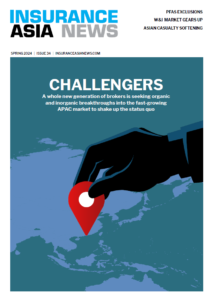Q&A: Canopius’ Mark Newman on environmental risk and ILS
May 11 2021 by InsuranceAsia News
As the Monetary Authority of Singapore (MAS) issues guidelines on environmental risk management, InsuranceAsia News (IAN) talks to Mark Newman, Canopius’ chief executive for APAC & MENA, about what these guidelines mean for insurers in the region.
Other issues discussed include the recent Ever Given incident in the Suez Canal, insurance-linked securities and how Covid-19 has impacted the Lloyd’s market in Singapore.
IAN: Being based in Singapore, what key regulatory developments at the MAS are you watching out for this year?
Newman: Firstly, Singapore as a whole is ramping up its efforts towards sustainability. The Monetary Authority of Singapore (MAS) recently issued guidelines on Environmental Risk Management for the insurance sector which calls for insurers to assess, monitor, mitigate and disclose the environmental risks relevant to them. In general, insurers are at different stages of the curve in terms of their environmental, social and governance (ESG) efforts, and this has prompted many, including Canopius, to integrate environmental risk management as part of our business operations.
Secondly, MAS guidelines on Individual Accountability and Conduct take effect from 10 September 2021 this year. They are aimed at strengthening the accountability of senior managers in key functions and promoting ethical conduct amongst employees. As Canopius in Singapore is a service company underwriting on behalf of our Managing Agency in London, we are able to leverage our group-wide framework, and we will be putting in place the necessary measures to meet the specific MAS expectations.
Lastly, another key regulatory development in recent years is the MAS’s Insurance-linked Securities (ILS) Grant Scheme which has seen a strong take-up rate, with over nine catastrophe bonds issued out of Singapore in a time span of two years. This is an interesting development for the Asia market as it provides alternative risk transfer solutions and access to a diversified investor pool. ILS is not a new area for Canopius Group — we have a physical presence in Bermuda and our team has extensive experience in structuring such transactions for investors. With our increasing presence in APAC, we are carefully watching the ILS space in Singapore, and it remains an option for us to venture into in the future.
IAN: How has the Lloyd’s market in Singapore and Asia evolved over the last year during the Covid-19 crisis?
Newman: Whilst the final outcome of legal reviews in Australia remain unknown, the claims impact from Covid-19 itself appears to be somewhat muted in Asia Pacific, in comparison to the rest of the world. Accordingly, the Lloyd’s Asia Pacific market will be likely less impacted than the broad Lloyd’s Corporation results. The total premium growth per annum from APAC written into Lloyd’s globally has increased by approximately US$200 million per annum over the last five years, with increasingly much of that income underwritten locally. With trade and therefore premium volumes likely to be flat or down overall in the entire market last year, Lloyd’s remains deeply committed to the region, and growing.
Despite the challenges of Covid-19 last year, the sense is that 2020 was also a better or more benign year for total regional claims activity. Some loss deterioration from prior years has been evident, especially from Japanese typhoon events of 2018 and 2019, along with some notable credit losses in the market for selected carriers. Otherwise underwriting performance looks strong as market pricing returns to technical levels. Those syndicates truly committed to Asia Pacific continue to hire regional underwriting and claims expertise and grow premium volumes accordingly. Headcount in service companies on the Lloyd’s Asia platform alone grew by 30 people in 2020. Most of these positions are in frontline roles, reinforcing the commitment to access regional premiums locally, and increasing and improving the access for brokers and clients alike. There are also new market entrants anticipated to join the Lloyd’s Asia platform in 2021.
IAN: What impact is the Ever Given incident likely to have on marine insurance market over 2021?
Newman: The true impact of this event currently remains unclear, and will only be known once the full quantum of claims loss is calculated, and presently there is only market speculation. The market reality is that this loss will take significantly more time to be fully understood and adjusted. Once known, this will undoubtedly affect the hull and cargo interests as well as impacting the liability markets. The expected market response is to bring increased focus and approach once again to ULCVs (ultra-large cargo vessels), and the significant aggregation of cargoes on a single vessel.
It will once again raise the spectre of how prepared the market and the broader marine industry is in predicting, managing, and responding to such significant events. The marine underwriting markets have generally seen a hardening price cycle during the last 18 to 24 months, and a loss of such significant potential impact, will undoubtedly prevail in the minds of both underwriters and reinsurers as 2021 progresses. Its unknown scale and consequences are likely to further strengthen, not weaken underwriters resolve, in charging adequate premium for ever increasing scale and concentration risk.
-
Q&A: Gallagher Re’s Mark Morley on renewals, inflation and pricing
- November 3
The Singapore-based APAC managing director shares his views.
-
Q&A: Swiss Re’s Mark Senkevics
- April 6
Head of P&C underwriting for Asia and ANZ on extreme flooding events in Asia, and how these can be managed going forwards.
-
Q&A: Hong Kong CIB’s chairman Alex Yip
- February 17
The broking association is prioritising professionalism and communication.
-
‘Great’ potential for HK, Singapore as ILS hubs: MS Amlin’s William Ho
- February 15
APAC CEO said Asian-based capital has "considerable potential" in this market but there is a long way to go.
-
FM Global | Resilience: No longer a choice
As climate disclosure becomes mandatory and new risks emerge from natural hazards, understanding the tools that are available to build resilience is more important than ever.

